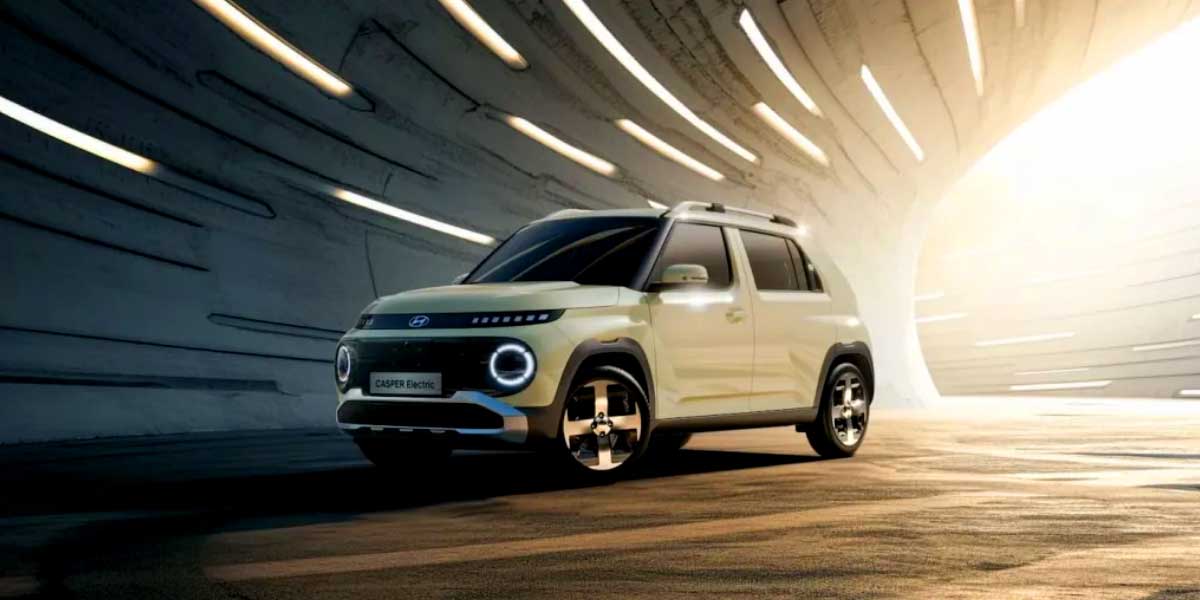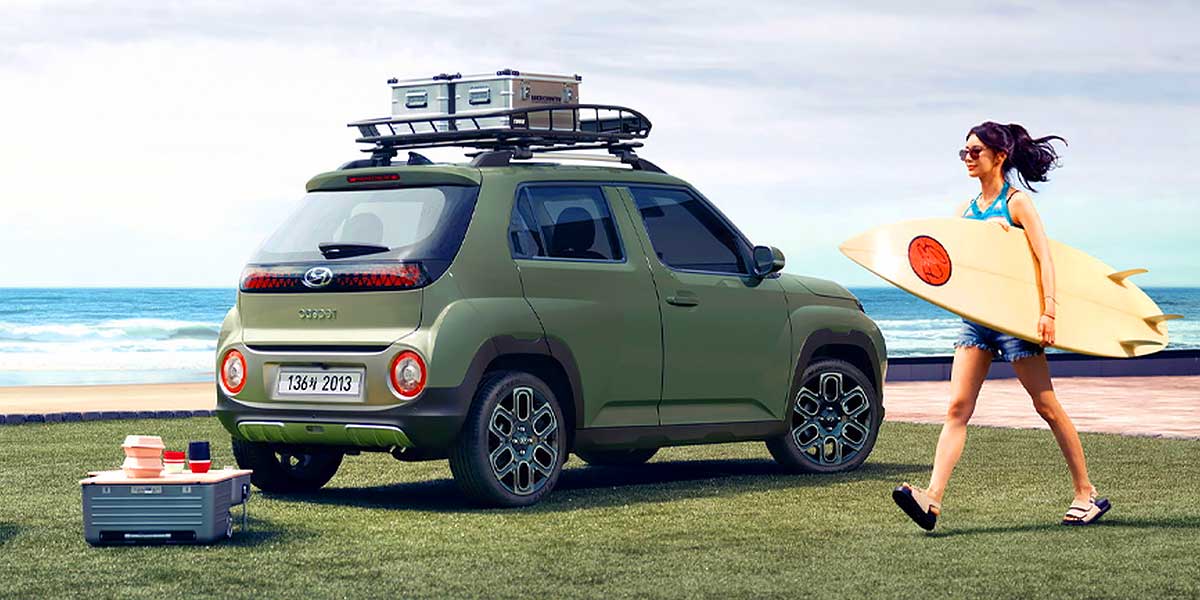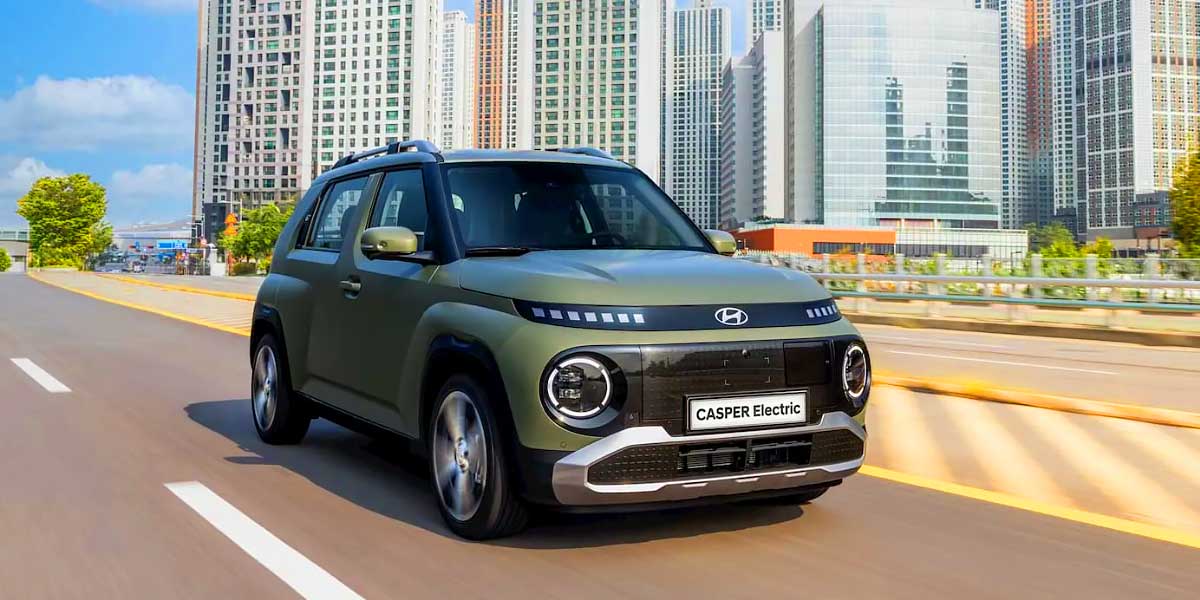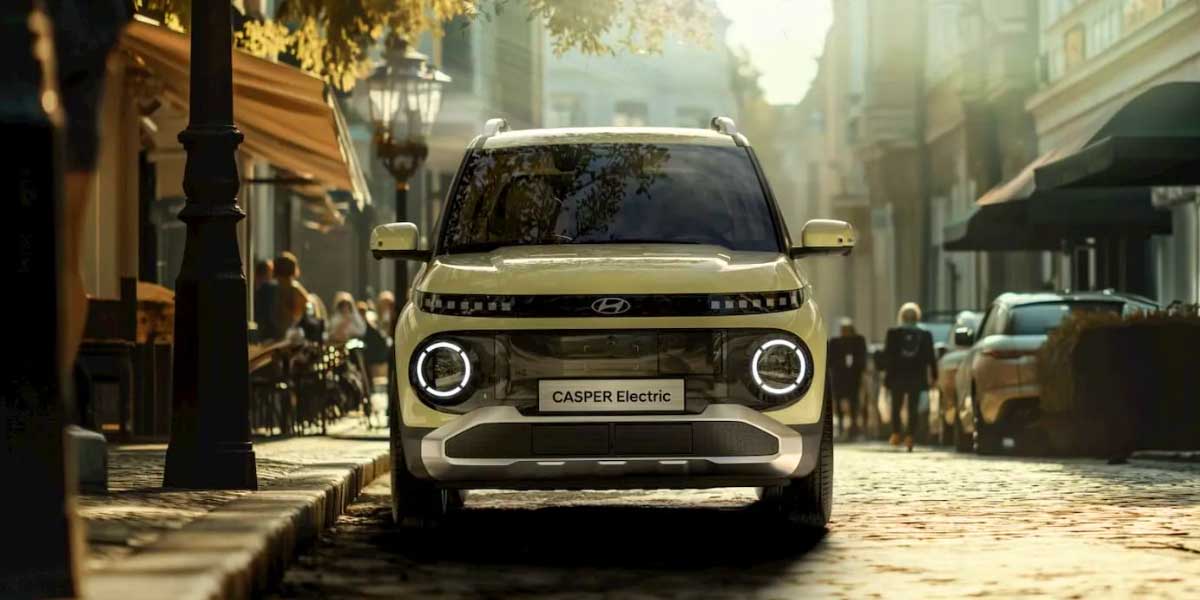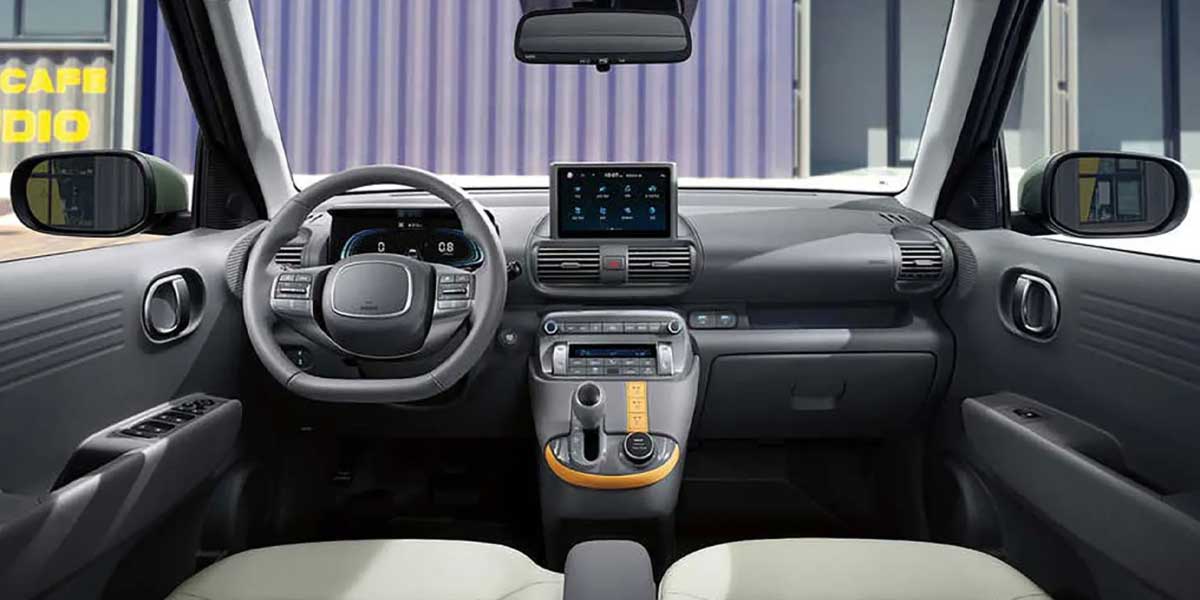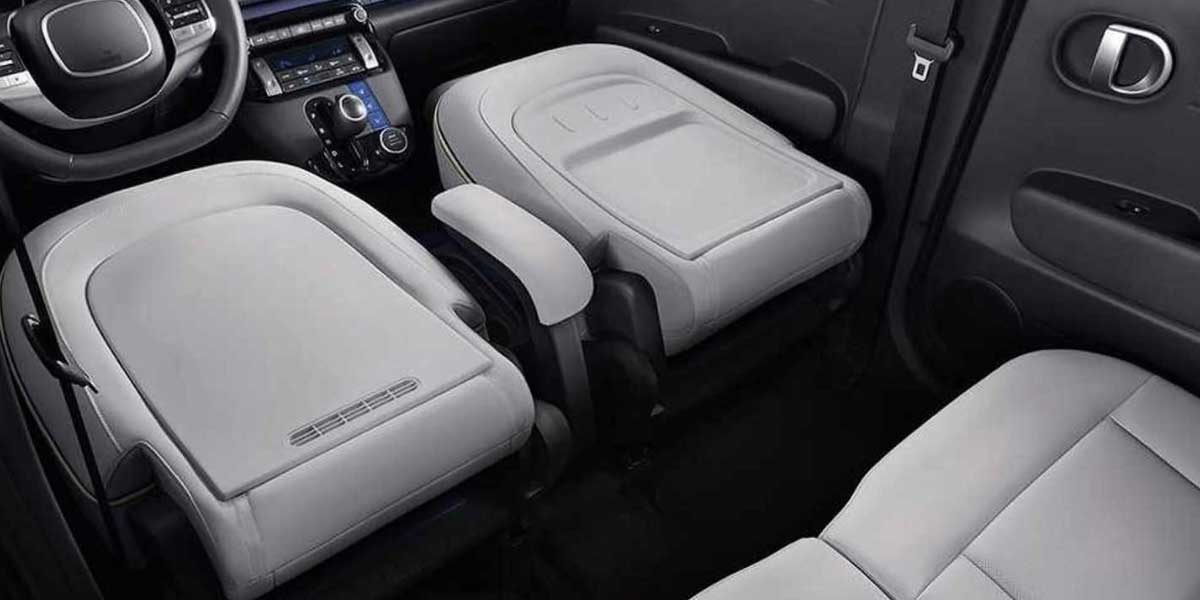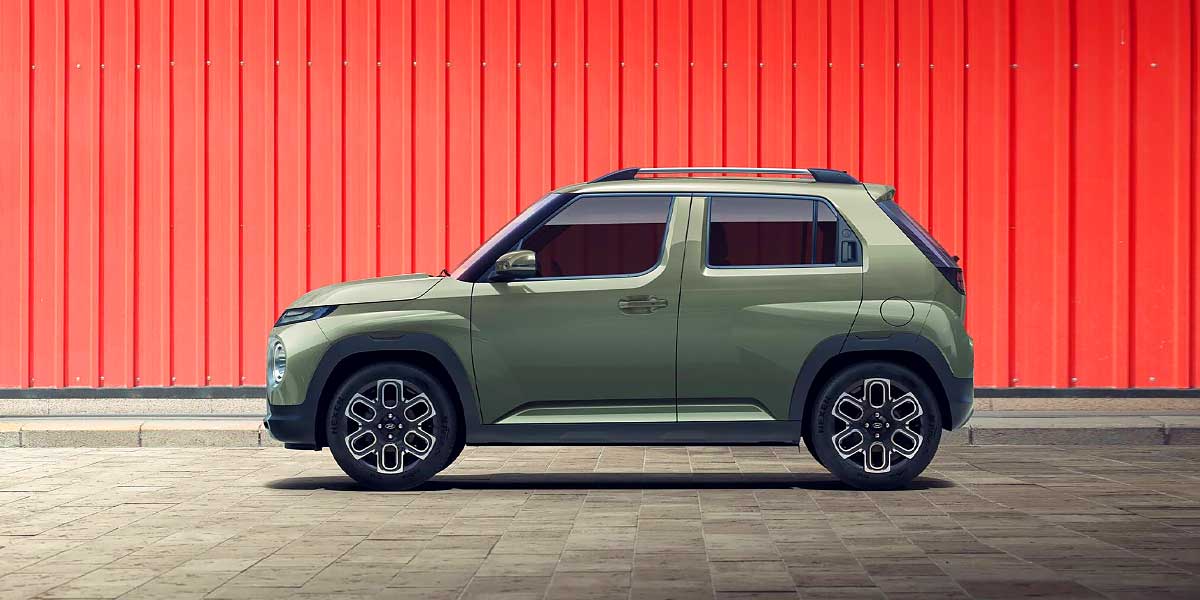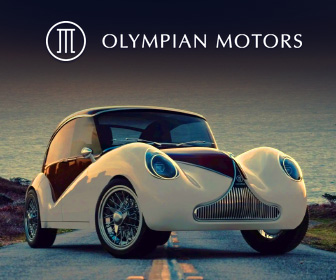Hyundai Casper
The Hyundai Casper stands out with its 355 km range, 49 kWh battery, and top speed of 150 km/h. The electric SUV boosts a 0-100 km/h acceleration in just 10.6 seconds, a 10.25-inch media system, and spacious rear seats with 160 mm longitudinal adjustment.
User Rating: 3 / 5 (15 votes)





Base Trim Price: $23000 USD *
| Body Type | SUV |
| Model Year | 2024 |
| Manufactured in | South Korea |
| Battery Capacity (kWh) | 49 |
| Electric range (km) | 355 |
| Max. Speed (km/h) | 150 |
| Acceleration 0-100 km/h (sec) | 10,6 |
| Power (h.p.) | 115 |
| Drive Type | FWD |
* Minimum price set for the base trim by the manufacturer

Hyundai Casper Review
Introduction to the Hyundai Casper
The Hyundai Casper, a subcompact electric SUV from South Korea, enters the market with ambitious goals. Competing directly with EVs like the Renault Zoe and the electric KIA Soul, the Casper makes a significant mark with its distinctive design and impressive performance metrics. The question remains, can it stand out in the rapidly evolving EV landscape?
Design and Dimensions
Externally, the electric Hyundai Casper distinguishes itself with a sleek blank black panel supplanting the conventional radiator grille. Sporting LED optics in trendy pixel style, the Casper's aesthetic appeal is beyond debate. With the shift to electric power, it scales to a larger class B framework — the wheelbase stretches by 180 mm to 2580 mm, while the vehicle’s total length extends by 230 mm to 3830 mm. Its width expands modestly by 15 mm, reaching a total width of 1610 mm. Hence, the Casper transitions from the smaller class A to class B, offering a more robust and spacious package.
Interior Features and Comfort
The cabin of the Hyundai Casper is modernized with a new three-spoke steering wheel and a minimalistic gear selector on the steering column. Featuring a larger 10.25-inch media system and instrument display, the Casper’s interior is both functional and aesthetically pleasing. Despite technological advances, the vehicle retains physical keys and handles for climate control, ensuring user-friendly operations. The increased wheelbase results in more generous rear-seat legroom, with adjustable seats that span 160 mm longitudinally. The trunk capacity fluctuates between 238 to 351 liters, accommodating various cargo needs. The possibility of a future five-seat version with a 60:40 split rear seat adds flexibility.
Performance and Power
The Hyundai Casper Electric boasts a 115 hp motor on the front axle with a 49 kWh battery, delivering ample power and efficiency. The SUV’s top speed clocks in at 150 km/h. Acceleration from 0 to 100 km/h is accomplished in 10.6 seconds, ensuring a responsive and dynamic driving experience.
Battery and Charging
An impressive feature of the Hyundai Casper is its 49 kWh battery, offering a substantial range of 355 km per charge. Charging the battery from 10% to 80% takes approximately 30 minutes using a 120 kW fast charger. For European customers, there's a 97 hp version available, equipped with a 42 kWh battery and a range of 300 km.
Practicality and Versatility
The Casper’s spatial design is practical, with rear seats that can be adjusted longitudinally, substantially enhancing passenger and cargo flexibility. The option to fold the seatbacks flat with the floor allows for various storage configurations, catering to diverse needs. With these intelligent design choices, Hyundai has ensured that the Casper is as functional as it is stylish.
Market Position and Pricing
Priced at $23,000 (approximately £18,000 or €21,000), the Hyundai Casper strikes a balance between affordability and advanced features, positioning itself competitively within the electric SUV market. Manufactured in South Korea, the Casper aims to capture a significant market share, especially for urban dwellers and tech-savvy consumers looking for an eco-friendly yet potent vehicle. The sales for the Hyundai Casper are expected to begin in 2024.
Conclusion
In the burgeoning realm of electric vehicles, the Hyundai Casper emerges as an agile, technologically advanced option with an enticing mix of design, performance, and practicality. Meeting the needs of modern consumers, this South Korean marvel is poised to make a significant impact.
Exterior and Interior photos of Hyundai Casper
Watch the Video Overview
F.A.Q. about Hyundai Casper
What is the range of an electric vehicle on a single charge?
The Hyundai Casper offers a range of up to 355 km (220 miles) on a single charge, making it suitable for both city and suburban commutes.
How long does it take to fully charge an electric vehicle?
Charging the Hyundai Casper from 10% to 80% takes approximately 30 minutes using a 120 kW fast charging station.
Are electric vehicles more expensive than gasoline cars?
While electric vehicles like the Hyundai Casper can have a higher upfront cost, such as $23,000 (£18,000, €21,000), they offer long-term savings on fuel and maintenance.
What is the price of a car?
The Hyundai Casper is priced at around $23,000, which converts to approximately £18,000 or €21,000.
What is a battery capacity?
The Hyundai Casper comes with a 49 kWh battery, providing a robust range of 355 km (220 miles) per charge.
Acceleration compared to other EVs?
The Hyundai Casper can accelerate from 0 to 100 km/h (0-62 mph) in 10.6 seconds, offering competitive performance within its class.
What is top speed?
The Hyundai Casper has a top speed of 150 km/h (93 mph), ensuring a dynamic driving experience.
Are there enough public charging stations available?
Charging infrastructure for electric vehicles is rapidly expanding, ensuring that vehicles like the Hyundai Casper can be charged conveniently at many locations.
How safe are electric vehicles in accidents?
Electric vehicles, including the Hyundai Casper, undergo rigorous safety testing and often perform well in crash tests, offering high safety standards.
What is the warranty coverage for electric vehicles?
Hyundai vehicles typically come with comprehensive warranty coverage, which is expected to include the Hyundai Casper, ensuring peace of mind for buyers.
Comparison:
Comparing Hyundai Casper with Other Electric Vehicles
The Hyundai Casper makes waves in the electric SUV segment, compared directly against rivals such as the Renault Zoe, electric KIA Soul, Peugeot e-208, and Honda E. Let's delve into the nuances that set these contenders apart.
Range
The Hyundai Casper offers a competitive range of 355 km (220 miles) on a single charge, placing it right in the sweet spot for city and suburban driving. The Renault Zoe extends slightly more, clocking in at approximately 394 km (245 miles), leading the pack. The electric KIA Soul follows closely with a range of 383 km (238 miles), and the Peugeot e-208 comes in at a respectable 340 km (211 miles). Meanwhile, the Honda E, designed more for urban environments, trails with a modest 222 km (138 miles). While not boasting the longest range, the Casper confidently holds its own.
Acceleration
Acceleration might be a less discussed yet vital aspect. The Hyundai Casper reaches 0 to 100 km/h (0-62 mph) in 10.6 seconds. The Renault Zoe nudges ahead with a 9.5-second sprint. However, the electric KIA Soul dramatically outpaces its adversaries with a 7.9-second dash, followed by the Peugeot e-208 at 8.1 seconds and the sporty Honda E at 8.3 seconds. Although the Casper isn't the quickest off the line, it delivers solid acceleration by any practical measure.
Power
Power ratings reveal the muscle behind the metals. The Hyundai Casper brandishes 115 hp. Stepping up, the Renault Zoe outputs 134 hp, and the Peugeot e-208 offers a punchy 136 hp. The Honda E manages 154 hp, while the performance-centered electric KIA Soul dominates with 201 hp. While the Casper might not be the brawn of the bunch, it provides sufficient power for a balanced driving experience.
Charging Time
The time it takes to recharge can make or break the driving experience. The Hyundai Casper can be replenished from 10% to 80% in just 30 minutes using a 120 kW charger. The Renault Zoe achieves a similar feat, taking 35 minutes. The Peugeot e-208 and the Honda E also match this efficiency at 30 minutes. Conversely, the electric KIA Soul lags slightly, needing 45 minutes for the same charge, making the Casper impressively one of the fastest to recharge in real-world conditions.
Price
When it comes to the wallet, the Hyundai Casper hits a sweet spot at $23,000 (approximately £18,000 or €21,000). The Renault Zoe edges higher at $24,000 (£18,800, €22,000), while the electric KIA Soul demands a premium at $32,000 (£25,000, €29,500). The Peugeot e-208 similarly positions itself at $31,000 (£24,000, €28,500), and the urban-centric Honda E rises to $34,000 (£26,000, €31,000). Clearly, the Casper offers substantial value, balancing cost with robust, reliable performance.

